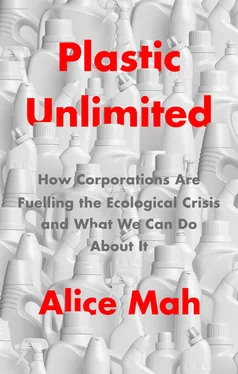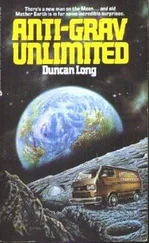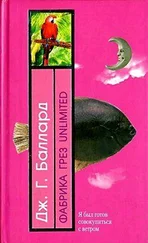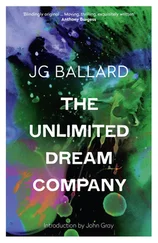In the middle of the plastics value chain, sandwiched between the consumer goods giants and the plastics producers, is the less-visible plastics converter sector. The majority of the plastics industry, in terms of both the number of businesses and the number of employees, is concentrated in the plastics converter sector. 62The plastics converters include a handful of global packaging companies (e.g., Novolex, Amcor, Berry Global), which rival the major petrochemical companies and big brands in terms of annual profits, but the sector as a whole is made up of primarily small and medium-sized enterprises. Then there is the recycling and waste management sector at the post-consumer end of the plastics value chain, which is also dominated by a few major players (e.g., Veolia Environmental, Republic Services). Over the past few years, several petrochemical corporations have partnered with recycling and waste management firms in response to the plastics crisis and circular economy policies.
Geopolitical differences are also significant. Up until the end of the twentieth century, the petrochemical industry was dominated by many of the same powerful oil and chemical companies that were ‘first movers’ in the early development of the industry in the United States, Western Europe, and Japan. 63While some of these corporations have remained top global players, notably ExxonMobil, BASF, and Dow, other corporations have entered the top ten list of global chemical companies, including Sinopec (China), SABIC (Saudi Arabia), Formosa Plastics (Taiwan), and INEOS (UK). 64There has been a dramatic growth in state-owned corporations in Asia, the Middle East, and South America, which now account for 30% of plastics producers worldwide. 65In the first two decades of the twenty-first century, China rose to become the top plastics producer and consumer in the world, overtaking the United States and Europe. During this period, other countries in Asia also became major zones for plastics production and consumption. Meanwhile, petrochemical investments in the United States, and to some extent in Europe, have been bolstered by the availability of cheap LNG feedstocks from the US shale gas revolution. The private petrochemical giant INEOS, owned by UK billionaire Jim Ratcliffe, has profited immensely from shale gas. Over the next decade, China’s growth is set to account for 28% of global petrochemical capacity additions, followed by India at 17% and Iran at 10%. 66This predicted expansion in plastics production is based on the industry’s success at promoting global demand for plastic products, which is expected to continue irrespective of policies to address plastic pollution. 67
Each industry segment has its own market position and set of interests within the plastics value chain. For example, the bioplastics industry (which uses bio-based feedstocks such as sugar and corn flour to make plastics) favours the substitution of virgin feedstocks with renewable resources, as contrasted with the mainstream plastics industry, but both oppose single-use plastics bans. 68Furthermore, corporations across the plastics value chain are heterogeneous, both within and across industry segments, with different cultures, traditions, and ambitions. Many state-owned enterprises, while competing in global capital markets, are driven by national and regional interests, such as China’s goal of energy self-sufficiency and the quest for diversification in oil-producing countries. Some corporations have been leaders in their voluntary sustainability commitments, at least in relative terms, for example through disclosing their plastic packaging footprints, while others have been laggards.
When it comes to the business of limits, though, corporations across the global plastics value chain do have some common interests. First, they each benefit from the problem of societal dependence. Unlimited plastics growth is inherently destructive and unsustainable, but modern societies have become too dependent on plastics to phase them out easily. Plastics are cheap, durable, and incredibly versatile, enmeshed in almost every aspect of modern life, from buildings to agriculture, healthcare, transport, clothing, and electronic devices. Second, in material terms, plastics represent seemingly unlimited possibilities for growth into new uses and markets, allowing corporations to constantly create the conditions for future plastics dependence. Third, given their reliance on fossil fuels, most corporations across the plastics value chain have vested interests in maintaining ‘business as usual’, enabled by powerful financial actors including investors, banks, insurance companies, and governments. Despite international regulations to address plastic pollution and the climate crisis, petrochemical and plastics companies have received extensive government subsidies, keeping artificially low costs of virgin feedstocks. 69On an existential level, corporations are wilfully ignorant about the problem of unlimited plastics growth, which is not only delusional but also self-destructive. Plastics growth will inevitably reach limits, imposed by the end of fossil fuels and biofuels, or by the mass extinctions that come with toxic pollution, climate disruptions, and biodiversity loss – whichever comes first. This means that unless there are serious political interventions, by the time plastics reach material limits, it will be too late.
For decades, corporations across the plastics value chain have developed powerful tools for protecting their interests through a combination of expertise and wilful ignorance. On the one hand, the leading corporations maintain market dominance through advanced scientific, technological, and economic expertise, from cutting-edge polymer science and chemical engineering to detailed knowledge of international and national laws, geopolitical and environmental risks, and market forecasts. They use their multiscalar expertise to their economic advantage, anticipating regulations, denying toxic hazards, and promoting risky new technologies. 70On the other hand, corporations are wilfully ignorant about their responsibility for social and environmental harms. Wilful ignorance is where people recognize that they are part of the problem but avoid confronting it, often through seeking forms of justification. We all do this, but as the sociologists Linsey McGoey and Hannah Jones argue, sometimes the act of looking away is strategic, to avoid legal liability, or violent, whether intentional or not. 71Through their wilful ignorance, corporations across the value chain avoid taking responsibility for environment injustice: the disproportionate exposure of communities of colour and poor communities to toxic pollution and waste. 72
This book focuses on corporations within powerful industries, rather than on the individuals who run them per se. Joel Bakan writes that it is crucial ‘to stay focused on the corporation as an institution , on how its legal structure compels the people who run companies to do what they do. … Some may personally believe in the corporate values that frame their work, while others may not.’ 73I agree that the people who run corporations are often guided by business imperatives to put the interests of profit over the interests of the public, regardless of their personal values. However, the narrative of ‘bad’ corporations versus ‘good’ individuals misses another important issue: the extent to which destructive worldviews and wilful ignorance have been normalized to the point of appearing benign. Even the most well-intentioned corporative executives find ways of passing the blame and reframing their own motivations as irreproachable. In The Value of Everything , economist Mariana Mazzucato makes a critical intervention into this problem, arguing that policymakers have lost the ability to distinguish between value creation and value destruction, due to a false narrative about corporate wealth creators, risk taking, and entrepreneurship which has become entrenched within political and public discourse. The consequence is that ‘those who claim to be wealth creators have monopolized the attention of governments with the now well-worn mantra of: give us less tax, less regulation, less state and more market’, which has ‘made it easier for some to call themselves value creators and in the process extract value’. 74This is what needs to change.
Читать дальше












